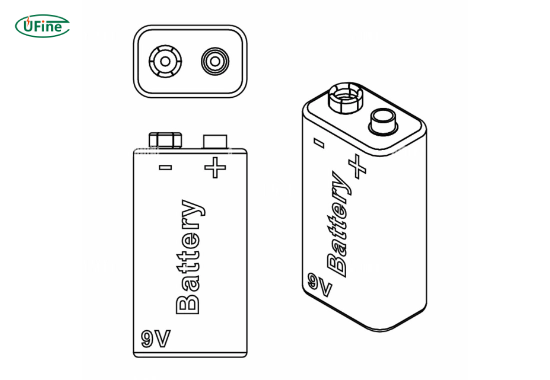
- Part 1. What are the batteries for fire alarms?
- Part 2. What are 9V batteries?
- Part 3. What are AA batteries?
- Part 4. 9V vs AA: Which battery performs better in fire alarms?
- Part 5. Best practices for smoke alarm battery maintenance
- Part 6. Which battery should you choose for your smoke detector?
- Part 7. FAQs about fire alarm batteries
- Part 8. Conclusion
Quick Overview: 9V vs AA Batteries for Fire Alarms
9V vs AA battery comparison summary: 9V batteries deliver higher voltage in a compact size and are commonly used in smoke detectors, while AA batteries offer greater capacity and lower cost when multiple cells are combined. For most fire alarms, 9V batteries are preferred due to compatibility and stable voltage output.
Fire alarm batteries play a critical role in home safety by powering smoke detectors that provide early fire warnings. In this guide, we compare 9V and AA batteries—the two most common smoke alarm battery types—to help you decide which one best fits your needs.
Part 1. What are the batteries for fire alarms?
Fire alarm batteries are the energy sources that keep smoke detectors functioning at all times. Without a working battery, a smoke detector cannot detect smoke or emit alerts. The two main types of batteries used in smoke detectors are 9V batteries and AA batteries, each offering different performance characteristics.
Why battery choice matters: The type of battery used in a smoke alarm affects how reliably it performs during an emergency. Choosing the right battery type ensures uninterrupted operation and timely smoke detection.
Part 2. What are 9V batteries?
9V batteries produce a nominal voltage of 9 volts and are commonly rectangular in shape. They consist of six smaller cells connected in series. These batteries are popular in smoke alarms, CO detectors, and walkie-talkies because they offer steady voltage output.
Advantages of 9V Batteries
- Stable Power Output: Ideal for low-current, always-on devices like smoke alarms.
- Compact Shape: The rectangular design fits most standard smoke alarm compartments.
- Long Shelf Life: Can retain charge for 4–5 years if stored properly.
Disadvantages of 9V Batteries
- Higher Price: Typically more expensive per unit than AA batteries.
- Lower Capacity: Shorter runtime compared to combined AA cells.
Part 3. What are AA batteries?
AA batteries are cylindrical 1.5-volt batteries widely used across household devices. Some newer fire alarms are designed to run on AA batteries instead of traditional 9V models. They are available in both alkaline and rechargeable lithium variants.
Advantages of AA Batteries
- Higher Energy Capacity: Multiple AA cells can store more total energy than a single 9V battery.
- Lower Cost: Easily available and cost-efficient for households.
- Versatile Use: Suitable for toys, remotes, and some smoke detectors.
Disadvantages of AA Batteries
- Requires Multiple Cells: Usually three AA batteries are needed to match a 9V battery’s voltage.
- Larger Size: Needs more space inside the device compartment.
Part 4. 9V vs AA: Which battery performs better in fire alarms?
For smoke alarms, battery reliability and longevity are critical. Here’s how 9V and AA batteries compare in terms of performance:
Quick answer: Most fire alarms use 9V batteries because they provide a consistent 9V output in a single cell, making them more reliable and space-efficient than using three AA batteries. However, AA-based alarms can offer longer runtime and lower replacement costs.
| Feature | 9V Battery | AA Battery |
|---|---|---|
| Voltage | 9V per cell | 1.5V per cell (need 3 cells) |
| Energy Capacity | Lower total capacity | Higher when combined |
| Price | Higher cost per battery | Lower cost and easy to find |
| Runtime | Medium (ideal for low draw) | Longer runtime |
| Typical Use | Smoke alarms, CO detectors | Flashlights, toys, AA-based alarms |
Part 5. Best practices for smoke alarm battery maintenance
To ensure your smoke detector operates safely, follow these maintenance practices:
- Test Monthly: Press the test button on your smoke alarm every month.
- Replace Every Six Months: According to the NFPA, replace 9V or AA batteries in fire alarms twice a year.
- Use High-Quality Batteries: Prefer lithium or alkaline batteries from trusted brands.
- Clean Regularly: Dust buildup can block the sensors; clean gently with a dry cloth.
Part 6. Which battery should you choose for your smoke detector?
The choice depends on the design of your fire alarm and your priorities:
- Choose 9V batteries if your alarm specifically requires a single-cell 9V input. They are compact and highly reliable.
- Choose AA batteries if your smoke alarm supports multi-cell operation and you want longer runtime and lower cost.
In general, most household smoke detectors are designed for 9V batteries, making them the safer default option.
Part 7. FAQs about fire alarm batteries
Can I use AA batteries instead of 9V in a smoke detector?
Only if the smoke detector specifically supports AA batteries. Always check the device label before substitution.
How often should I replace my smoke alarm batteries?
Replace batteries every six months, and test alarms monthly for safety assurance.
Can I use rechargeable batteries in smoke detectors?
Yes, but only if the manufacturer states compatibility with rechargeable 9V or AA cells.
What happens if I use an expired or weak battery?
Expired or weak batteries can cause false alarms or prevent the detector from working during emergencies.
What is a 9V battery substitute for smoke detectors?
Some newer smoke alarms use two or three AA batteries instead of one 9V cell. Always verify voltage requirements before replacing.
Part 8. Conclusion
Both 9V and AA batteries can power smoke detectors effectively, but most standard alarms are designed around the 9V battery format. It delivers a stable, single-source voltage ideal for consistent operation. To keep your home safe, test alarms monthly, replace batteries twice yearly, and choose high-quality lithium or alkaline cells for the best performance.
Related Tags:
More Articles

What are Watts and Watt Hours in Battery?
Understand watt vs watt-hour in batteries, how to calculate battery watt hours, and what Wh means for car batteries, devices, and energy storage.
A Complete Guide to the Best Batteries for Flashlights
Compare the best batteries for flashlights, including AA, AAA, 18650, 21700, CR123A. See which battery offers the best brightness, runtime, and reliability.
How Long Do Rechargeable AA Batteries Last?
How long do rechargeable AA batteries last? Compare NiMH and lithium AA lifespan, recharge cycles, key factors, and performance vs alkaline batteries.
How Much Current Can a 9V Battery Really Supply?
Discover how many amps a 9V battery can supply, its actual current output, discharge rate, and capacity for alkaline, lithium, and rechargeable 9V batteries.
12V STD vs 12V AGM: Meaning, Differences, and Which Is Better
Understand what STD and AGM batteries mean, their key differences, and which 12V battery fits your needs best in 2026.




